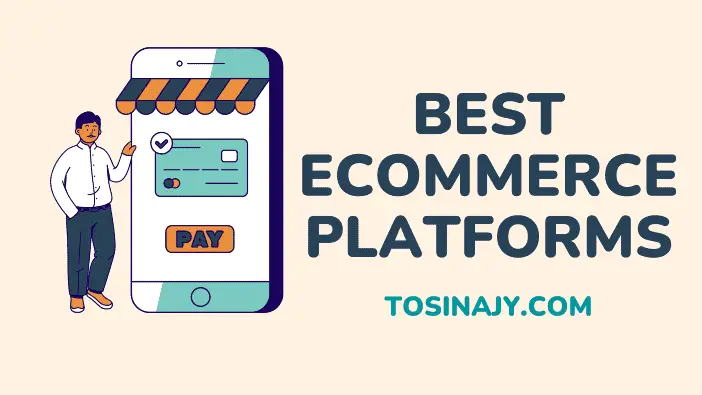Ecommerce is beginning to hold a very important central position in our lives, hence the need for reliable eCommerce platforms. As indicated by Jeff Bezos, Amazon has more than 100 million Amazon Prime customers.
As of today, free shipping is the current industry standard as online consumers are looking for two-day shipping, one-day shipping, and even two-hour shipping.
If you’re looking to start your eCommerce store, picking the best eCommerce platform can be quite challenging. There a handful of eCommerce platforms offering different solutions for your online store business.
The goal of this article is to simplify your selection process. You will be able to ascertain your needs. Furthermore, learn the best eCommerce platforms that best fits your business goals.
Let’s be honest – with endless options in the market, picking the best eCommerce platform can be a daunting task. Some honorable picks may be left out of this list as we are selecting the best of the best eCommerce platforms.
The platforms are ranked based on price, popularity, dependability, technical support, features, versatility, shipping, and more.
What are the best eCommerce platforms?
Ecommerce platforms are great tools to sell products online. When picking from the best alternatives, there are numerous considerations, and each eCommerce website designer provides various features.
For instance, your necessities will be extraordinary in case you’re selling three items versus 100. Or then again, in the event that you want to do dropshipping as opposed to your own shipping and satisfaction.
Finally, the best eCommerce platforms let you include your items rapidly, offer coupons and discounts, and spontaneously track stock. They ought to likewise help oversee shipping and satisfaction so you can concentrate on maintaining your business.
Below are my picks for the best eCommerce platforms to attempt this year:
1. Squarespace

Squarespace is a well-known website designer, whose third highest-priced package has simple eCommerce functionality.
They have four key pricing strategies-two monthly strategies for website designers and two monthly plans for online shops:
- Personal Plan: $12/month
- Business Plan: $18/month
- Basic (Online Store): $26/month
- Advanced (Online Store): $40/month
Before moving my blog to WordPress I began with the Personal Plan for Squarespace. Dragging and dropping content on my site was effortless, and editing their pre-designed templates. I soon realized, however, that Squarespace was not the best choice for SEO, site speed, or customizations.
Squarespace enables the development of a website for those without technical expertise but what you gain in ease of use, you lose in flexibility and SEO benefits. When I used them, I recall getting a clear XML sitemap problem that affected my SEO and couldn’t be resolved.
Some URLs had a trailing slash (/) in my sitemap, while others didn’t, making it look like every page was duplicate material. Long story short, it had an effect on my SEO, and immediately I switched to WordPress.
As far as eCommerce solutions go, have you ever heard someone say, “I’m running my lucrative online Squarespace business.” Probably not. But if you are using this platform already and want to add a simple eCommerce store, there are some benefits.
The setup is simple. The platform provides mobile-friendly models, product management, and integration with shipping solutions such as ShipStation. Third-party logistics and order fulfillment companies provide real-time delivery costs from major suppliers such as UPS, FedEx, and USPS, and can take care of the shipment.
Squarespace finally provides 24/7 support and a free 14 day trial to test its functionality.
2. BigCommerce
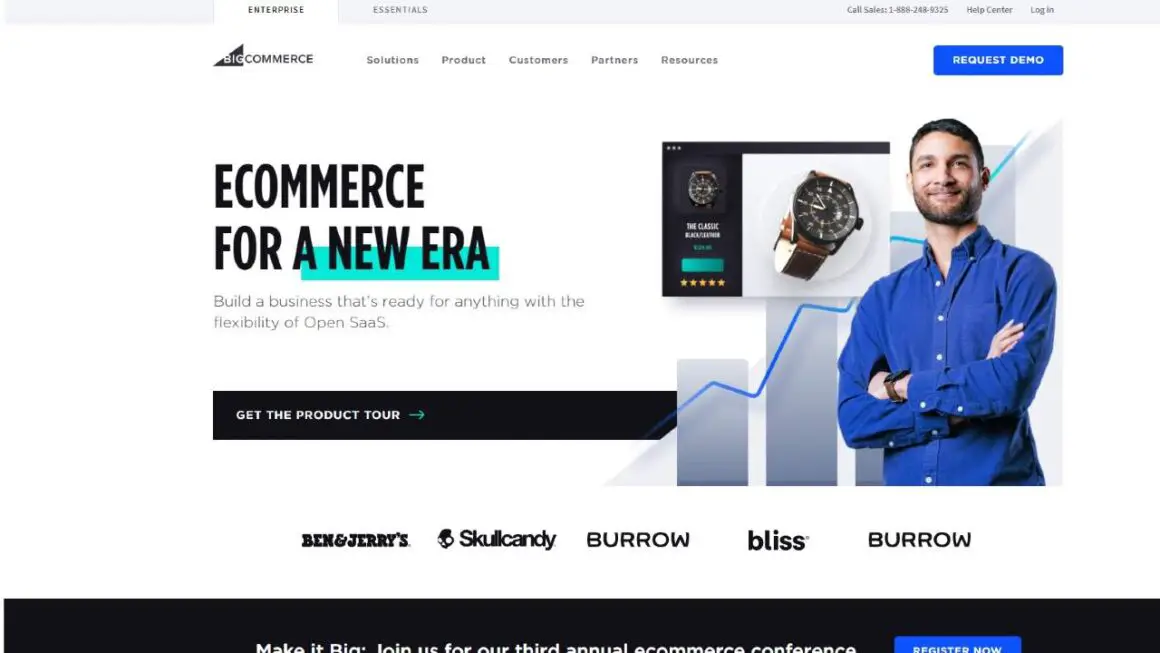
BigCommerce has top tier SEO features, over 40 payment gateways, advanced product choices, all-day support, and can scale with your eCommerce business up to over $100 million annually.
They are the most open SaaS eCommerce stage on the market. They offer open APIs, no transaction fees, and an open partner ecosystem.
BigCommerce has two product offerings: the ‘BigCommerce’ (their enterprise offering) and the ‘BigCommerce Essentials’ (for small businesses). Both are built to scale with your development.
From one perspective, they are an available stage for small business owners due to their features and built-in functionality. Yet, there is a marginally higher learning curve than an easier tool like Wix.
They’re likewise ideal for enterprise brands hoping to leave expensive on-premise solutions like Magento and move to software as a service (SaaS). Top brands like Ford, Toyota, Skullcandy, and much more use BigCommerce and can acquire over $100 million in yearly sales without any trouble.
In December 2018, they launched BigCommerce for WordPress, a “headless business” product, permitting users to manage their front end content on WordPress and their backend eCommerce with BigCommerce.
This utilization of APIs allows for quicker WordPress site speed than you find with other WordPress eCommerce options like WooCommerce, which installs multiple plugins to work and hampers performance.
Their plans begin at $29.95/month, and with that, you get a branded online store and domain name with the ability to sell on different sites like Amazon, eBay, and even social media platforms like Instagram, Facebook, and Pinterest.
They have a straightforward user interface to build your online store, including sections for your orders, products, taxes, marketing, analytics, and your storefront:
With the recently launched BigCommerce Shipping features, you get discounted carrier rates and get the ability to print shipping labels and oversee fulfillment right in your dashboard.
Their themes are completely responsive and streamlined with conversion rates in mind. They also offer free SSL certificates, have a clear pricing structure, and no transaction fees.
BigCommerce gets my highest recommendation for medium to large businesses and you can get started with a 15-day free trial.
3. Square Online
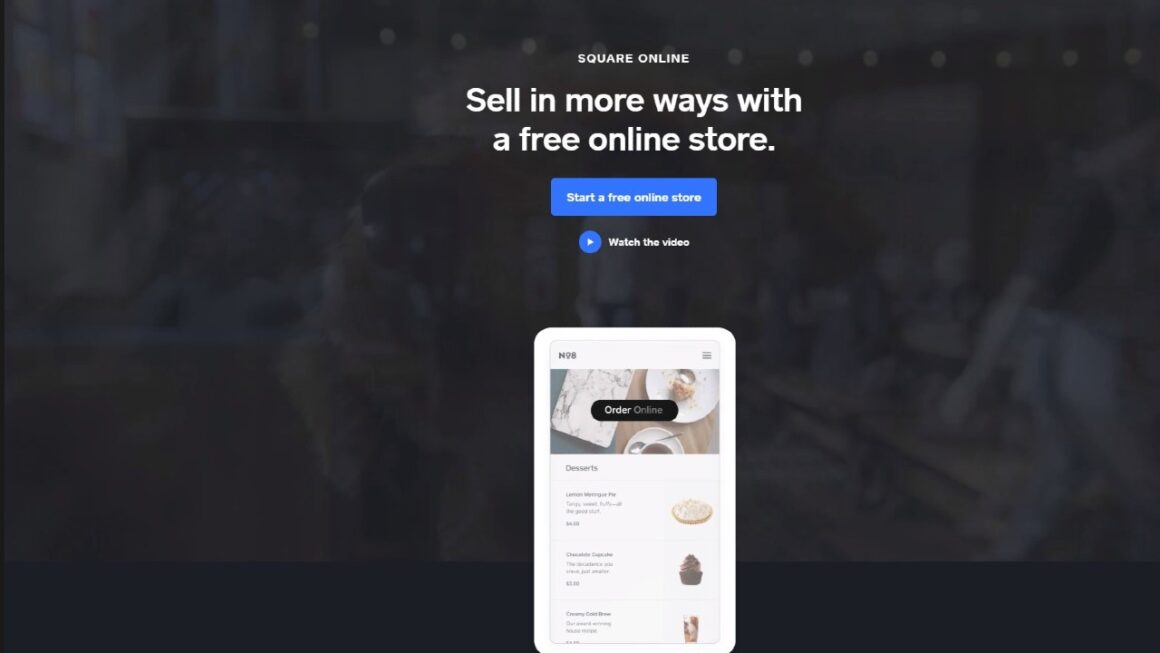
Square, the well-known POS system, introduced Square Online as an eCommerce proffering to assist retailers to move their businesses online.
It’s a strong standalone eCommerce stage but also adds great choices for local businesses, like curbside pickup and local delivery.
Here’s how you can begin with Square Online:
- Create your website using their pre-designed templates, add pages with page editors, and include your store details.
- Include products in your store.
- Create your store for free (only pay 2.9% + $0.30 per transaction). Or you can move to a paid plan for more advanced elements.
It’s an extremely simple setup and a flexible option made for small businesses hoping to rapidly and easily move online.
You can sell directly from your Instagram account and then upgrade to a full eCommerce website when you feel that you’re well prepared.
Another powerful attribute is their secure online payments and the ability for customers to pay through Apple Pay and Google Pay.
Square Online also has a number of remarkable features for small business websites:
- Online bookings can be made through Square appointments.
- Online food ordering for restaurant websites is also available.
- Donations can be accepted for nonprofit websites.
Pricing:
Square Online comes with a free plan, which includes uploading unlimited products, in-house, and on-demand delivery, an SSL certificate for better security, gift cards and coupons management, integration with social media, inventory update with Square point-of-sale service, SEO tools, and so on.
You only get to pay the 2.9% + $0.30 transaction fee and $0.50 per delivery. One setback of this plan is that you don’t get to use your own domain name.
If you did like to upgrade to one of their paid plans, you get extra features:
- Professional plan ($12/month): Custom domain name (which is free for one year), publish contents to a custom domain, and no Square branding.
- Performance plan ($26/month): Adds abandoned cart emails, posts customer reviews on-site, and discounted shipping labels.
- Premium plan ($72/month): Lower transaction fees, highest shipping rates discounts, and a real-time shipping rate calculator to avoid shipping charge issues.
This is nice because you can scale your plan as your online business develops. If you’re a newbie seller, I suggest you get started with their Professional Plan and then scale up to the higher-tier plans as your business grows.
Generally, Square Online is a great choice if you’re a traditional retailer or local business looking to move online.
4. nopCommerce
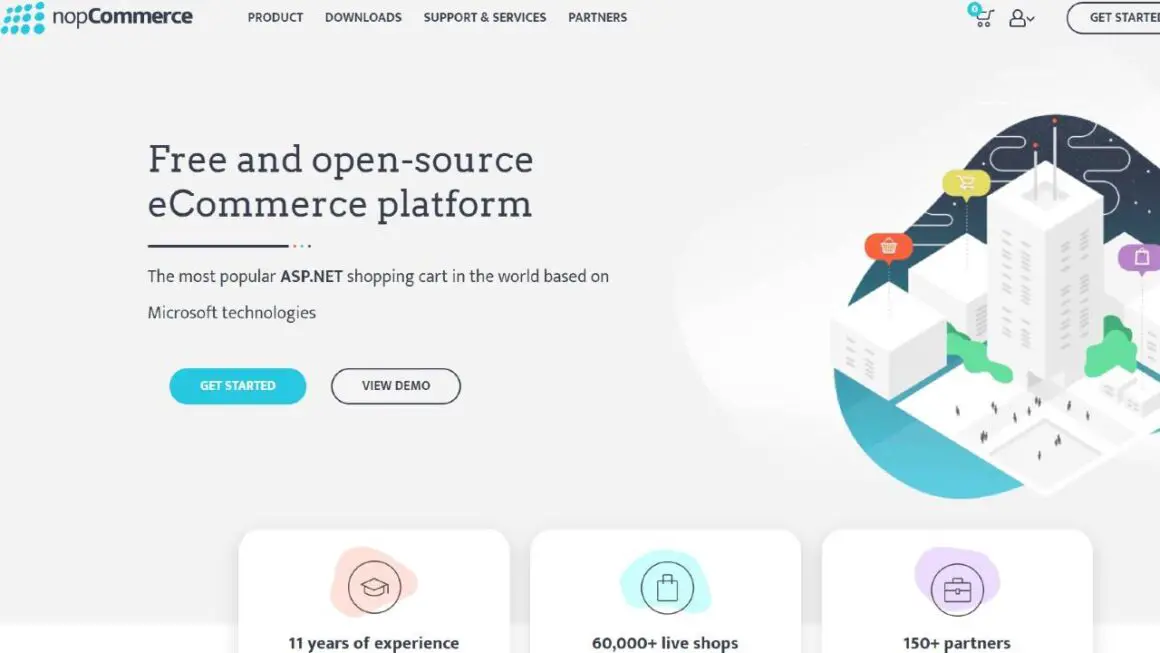
nopCommerce is a popular free Microsoft-based eCommerce platform. For 11 years they have been around and now boast 60,000 live online shops and 150 + partners.
ASP.NET is Microsoft’s open-source web platform used to create web applications using the. NET technology.
This tech reduces the amount of code needed when designing complex applications. Its caching technology, native optimization, and just-in-time compilation increase performance for large websites.
Unlike other website builders on this list, you’ll need a highly versed developer in HTML, JavaScript, and CSS to create a sensitive, high-quality eCommerce website.
Learning this technology is not inherently challenging, but harder for small business owners looking to quickly put up a simple site.
They have a free platform, with no transaction fees or monthly fees.
The backend of the nopCommerce platform allows you to post unlimited items, manage multiple stores and vendors from one place, measure shipping rates, and use their integrated marketing tools.
They also support your website’s free mobile edition right out of the box, without any extra coding needed.
Their platform is ideally suited to developers, small businesses, and enterprises with diverse business needs. Some of their top customers include Microsoft, The North Face, and BMW Party.
If you’re looking for a great free platform and need a completely personalized website, check it out at nopCommerce.
5. Zyro
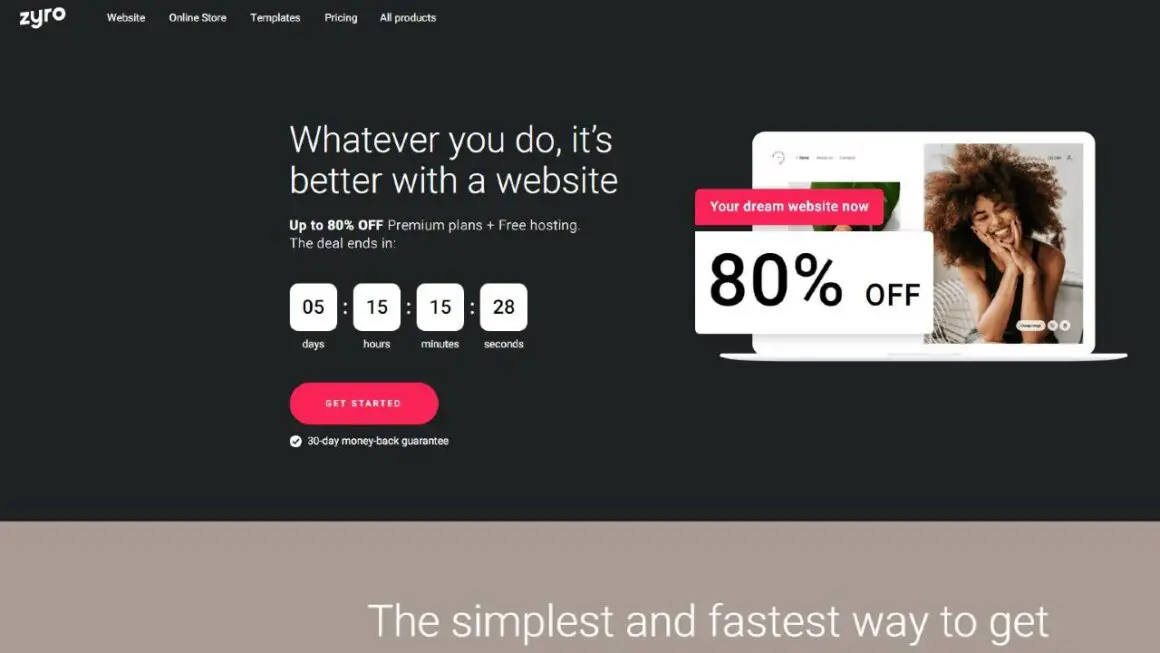
Zyro is a famous website builder that just delivered its hotly anticipated Zyro eCommerce platform.
Launched in early 2020, their new online store builder takes the entirety of the incredible highlights they’ve created throughout the years as a website builder and adds a full suite of eCommerce highlights.
This platform stands out in a few key areas. To begin with, they give their merchants the ability to sell products across various channels, including Amazon, Instagram, and Facebook.
Second, it’s easy to use. Just like Shopify, they say that you can start selling in less than an hour. And it’s true. With their drag and drop website capabilities and fast set up guide, it’s an easy code-free process.
Zyro offers everything you need to run an online store, including:
- Free hosting
- Order and inventory organizing
- Over 50 payment options and commission-free sales
- Gift cards and discount codes
- Email messages and notifications
- Numerous storefronts: online store, plus Instagram, Facebook, and Amazon
- Shipping and tax supervision
There are a few small setbacks though.
Since they are such a new platform, advanced highlights are still being created and may be missing. Zyro as of now has 68 eCommerce themes to pick from. I also discussed with their team and they promise to have over 150 new themes soon. Not terrible for a new platform!
Pricing:
Together with their free plan, Zyro included two new eCommerce plans: Ecommerce (most popular) and Ecommerce +.
- Their ‘Basic’ plan (which is suited for personal brands) is $3.19/month.
- Their ‘Unleashed’ plan (for businesses) is $3.99/month.
- The ‘Ecommerce’ plan (which is the most popular one) is $8.99/month.
- The ‘Ecommerce +’ plan is $13.99/month. This plan adds highlights like multi-channel sales, abandoned cart recovery, and multi-lingual stores.
Generally, if you want an easy-to-use, multi-channel internet business platform, give Zyro a try. It is the best eCommerce platform for the fore-mentioned features. You can begin with a free plan to test out its website features, then move up to an eCommerce plan when you’re prepared.
6. Ecwid
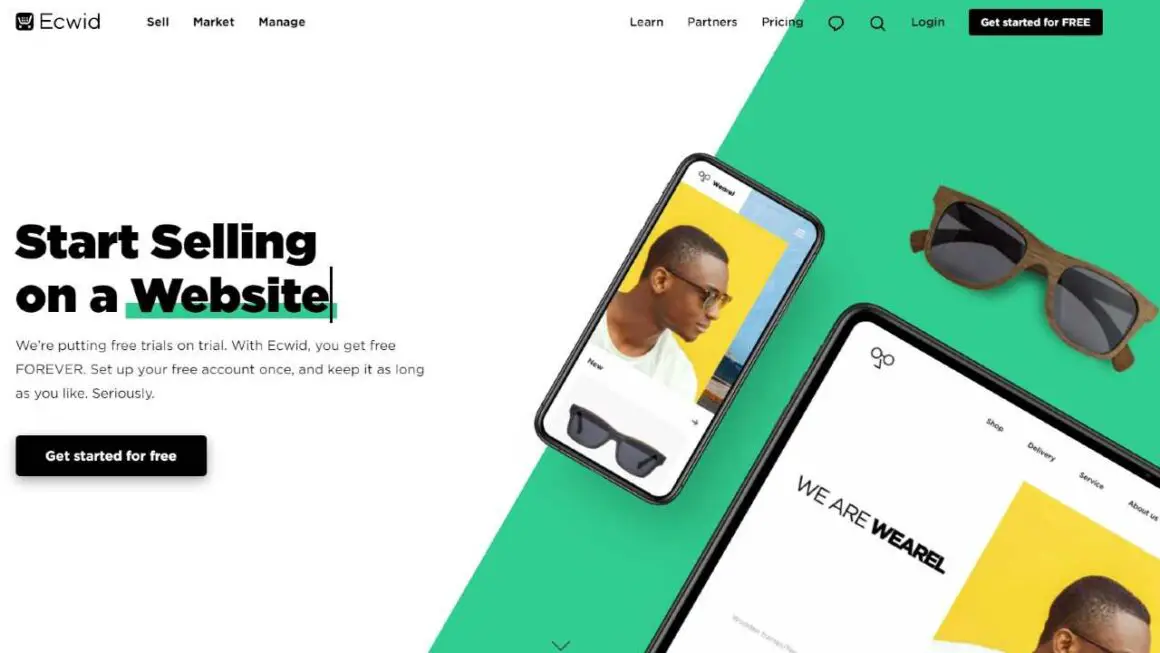
With a customer size of 1.6 million small businesses, Ecwid is an outstanding and one of the most popular internet business platforms available.
It is most satisfactory if you already have a website and feel that you want to add a new store or shopping capabilities to it. The good news is that the platform is easy and straightforward to use.
Furthermore, it’s wholly flexible and enables users to sell on various sites like:
- eBay
- Amazon
This assists you to reach out to a great number of buyers across the world on different stages from just one dashboard.
Beginning with Ecwid is also decidedly simple. And if you run your site on stages like Drupal, Joomla, or WordPress Business, then things become even simpler for you because of Ecwid’s in-built integration with them.
Moreover, it has a highly customizable storefront, which ensures maximum visibility for your products – irrespective of the device the customer is using. You can prominently exhibit brand elements like colors, logos, and messages to attract your intended audience.
Ecwid also permits you to make, oversee, and track all of your ads right from the dashboard itself. Curating the perfect Facebook advertisements or Google advertisements is also quite easy.
The payment process is simple, courtesy of Ecwid’s smooth integration with over 50 payment gateways like Square, Stripe, First Data, PayPal, WePay, and more through an in-built functionality with top POS systems.
In addition, Ecwid is a ‘PCI DSS validated Level 1 Service Provider,’ which helps it establish end-to-end data encryption and guard customer and merchant payment details.
Some of Ecwid’s other unique capabilities are:
- A simple checkout process
- Inventory tracking
- Saving preferred products
- Overseeing product options
- Automatic updates
- Smart shipping calculations
- A thorough customer address book
All these highlights (among others) help Ecwid stand out from its peers. Having said that, it has its limitations as well. Firstly, it doesn’t provide services in languages other than English. They also do not offer any telephone support.
Pricing:
The feature-rich and diverse pricing plans compensate for all the limitations. The good news is that Ecwid comes with a free plan that offers all the necessary functions and lets you sell ten physical items in a month.
They also provide three paid plans.
- Their ‘Venture’ plan lets you sell 100 digital or physical items for $12.50 per month (when billed annually), and $15/month when billed monthly.
- The ‘Business’ plan comes at $29.17 per month (when billed annually), and $35/month when billed monthly, allowing you to sell 2,500 products.
- The ‘Unlimited’ plan comes at $82.50 per month (when billed annually), and $99/month when billed monthly. It also includes all sales channels.
7. Shopify
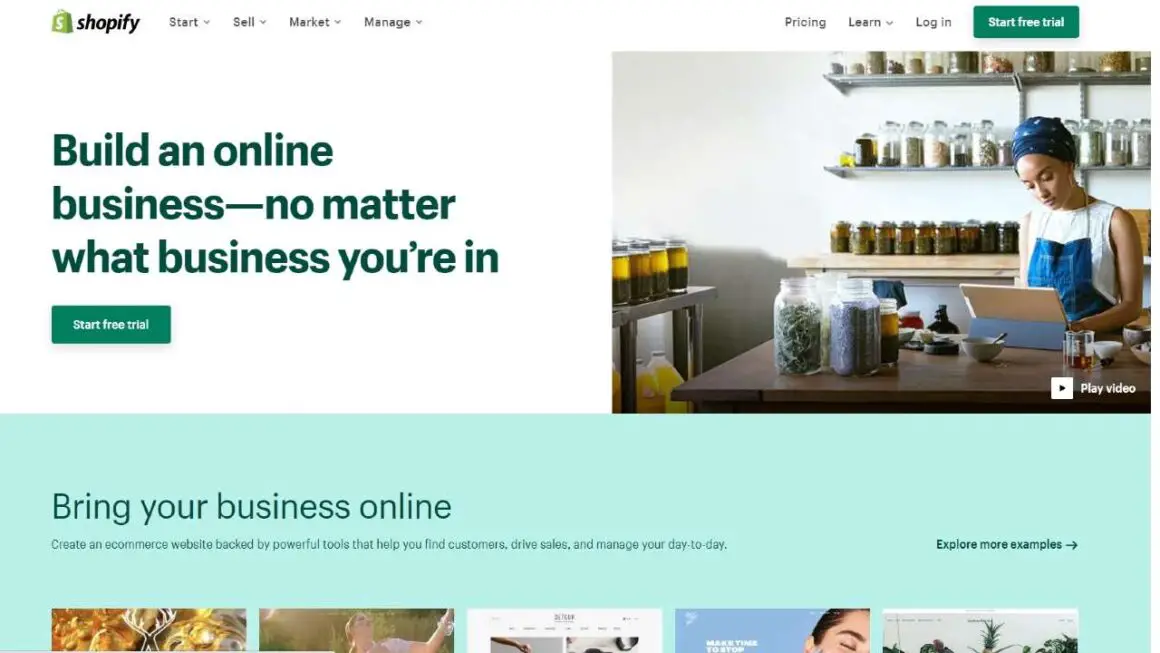
Shopify is an eCommerce powerhouse, hosting over 400,000 merchants around the world. They’re a Canadian organization that launched in 2004 and quickly became one of the fastest-growing SaaS organizations in North America.
Not satisfied by existing mobile applications and eCommerce products on the market, Tobias Lütke, Daniel Weinand, and Scott Lake developed their open-source web application with Ruby on Rails and launched it after two months. That program became Shopify.
One reason that made Shopify gain massive brand awareness was by engaging the audience of “visionaries” (new users who want to strike it rich in eCommerce).
With their incorporations, even the most inexperienced users can set up a dropshipping store with relative ease. But just because you have an online store doesn’t mean it is a prosperous one – you need to advertise your business.
A couple of downsides to Shopify are their SEO rules. Your URL structure is limited to its format. For instance, rather than category pages located at campingsite.com/tents, Shopify forces you to use their format of campingsite.com/collections/tents. This structure is not ideal for search rankings, particularly considering “category” is a higher-level subfolder than the more critical keyword “tents.”
Next, they have lesser product options than BigCommerce. If you are selling t-shirts, for instance, and have different materials, colors, and sizes, your SKUs add up rapidly. Shopify is to just 100 item variations – insufficient in the event that you have a variety of product combinations.
Constraints aside, Shopify is a reliable eCommerce platform that functions well for small businesses.
Shopify has three plans going from $29 to $299. Also, its enterprise Shopify Plus platform offers its own custom pricing.
All plans include boundless products, discount codes, easy buy buttons, free SSL, inventory management, multilingual support, abandoned cart recovery, marketing features, and 24/7 support.
They offer a 14-day free trial so you can test them out yourself.
8. 3dcart
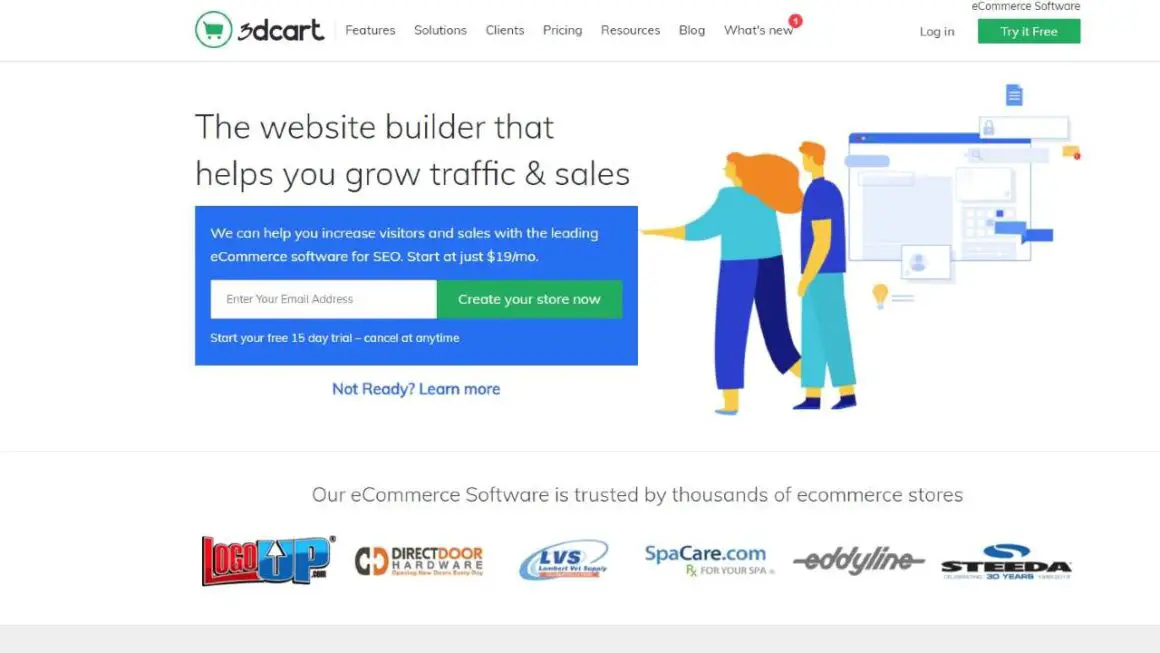
3dcart is one of the fastest developing eCommerce platforms known for its robust SEO highlights, 50 free themes, and 100+ payment processors.
Their plans run from $19 every month for a Startup Store and up to $114.50 every month for their Pro Store plan. All plans are accompanied when domain registration, API access, no transaction charges, a Facebook store, a built-in blog, unlimited bandwidth, and 24/7 tech support.
They just released new shipping settings and an upgrade to their promotional tools. For shipping, you can show all of your order’s shipping carriers and fees on your checkout page instead of just one at a time.
Then fees are loaded automatically when a buyer checks out with their PayPal or credit card.
With their Advanced Promotion Manager, you can pick a variety of Customer Groups to offer a promotion at once instead of one group like in the past. This pick is great for B2B brands that want an online shopping cart for both consumers and retailers.
Their SEO features are powerful and they are touted as “the best eCommerce platform for SEO”. You can develop custom URLs, link titles, dynamic meta-tags, and more.
They also take security gravely and are 100% PCI compliant. You can also sell outside of your internet business platform with the 3dcart built-in Facebook store. Plus, you can reach shoppers on the go with mCommerce for mobile devices.
Finally, if you’re a small business that needs strong SEO, marketing tools, and eCommerce functionality without the need for advanced enterprise features, 3dcart is a great pick.
You can try them out with a 15-day free trial which has been made available.
9. Sellfy
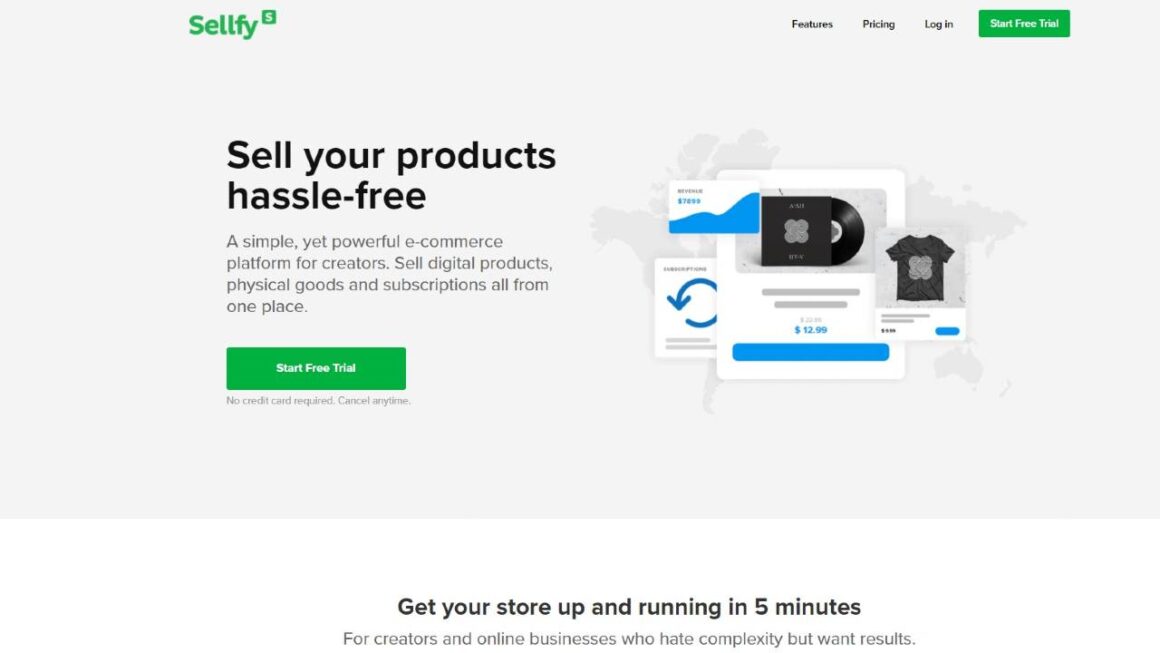
Sellfy is a simple but powerful platform for eCommerce that permits you to sell digital items, physical goods, and subscriptions from one location.
Their tool was initially developed to sell digital goods (such as eBooks, videos, music, and courses), but they now provide a fully integrated platform with all the features required to sell physical items as well.
Sellfy has integrated marketing tools and analytics and integrates with Zapier with more than 1,000 third-party applications.
With a user-friendly interface and the ability to get your site up in only a matter of minutes, Sellfy is perfect for writers, developers, and small businesses looking to sell digital items, subscriptions, and physical goods on their website, through buy buttons, and on their social media accounts.
With buy buttons now it can easily connect your website and product pages with your YouTube channel, Instagram, or Soundcloud account.
Moreover, you don’t need to install multiple applications for your eCommerce site as Sellfy offers email marketing tools, coupon codes, upselling functionality to improve your sales, and more.
And since it is cloud-based, it can be accessed from different devices like laptops, mobile devices, tablets, and PCs.
Some of its other main features include:
- Extensive interface customization makes inserting your logo, changing colors, etc. easier for you
- Enables you to introduce your own personalized domain
- You can pick any language you wish for your store
- Offers a streamlined mobile app for a smooth experience- Integrates with payment gateways such as PayPal and Stripe
- Provide in-depth analytics to track goods that perform best, evaluate traffic channels, see top locations, and more
- Conformance with PCI-DSS
- Comes with a free time trial of 14 days.
Pricing:
The Starter Package is $19 / month, the Business Plan is $39 / month and it costs $89 / month for their Premium Plan.
All plans allow you to sell your goods online, embed “buy now” buttons, add shopping carts, incorporate various payment options and provide powerful analytics.
You have no more transaction fees to pay. You can get email credits and upselling features in the Business and Premium Plans, as well as priority customer service.
Their Premium Package also provides conversion services from a separate provider to migrate from.
Give Sellfy a test with a 14-day trial.
10. WooCommerce
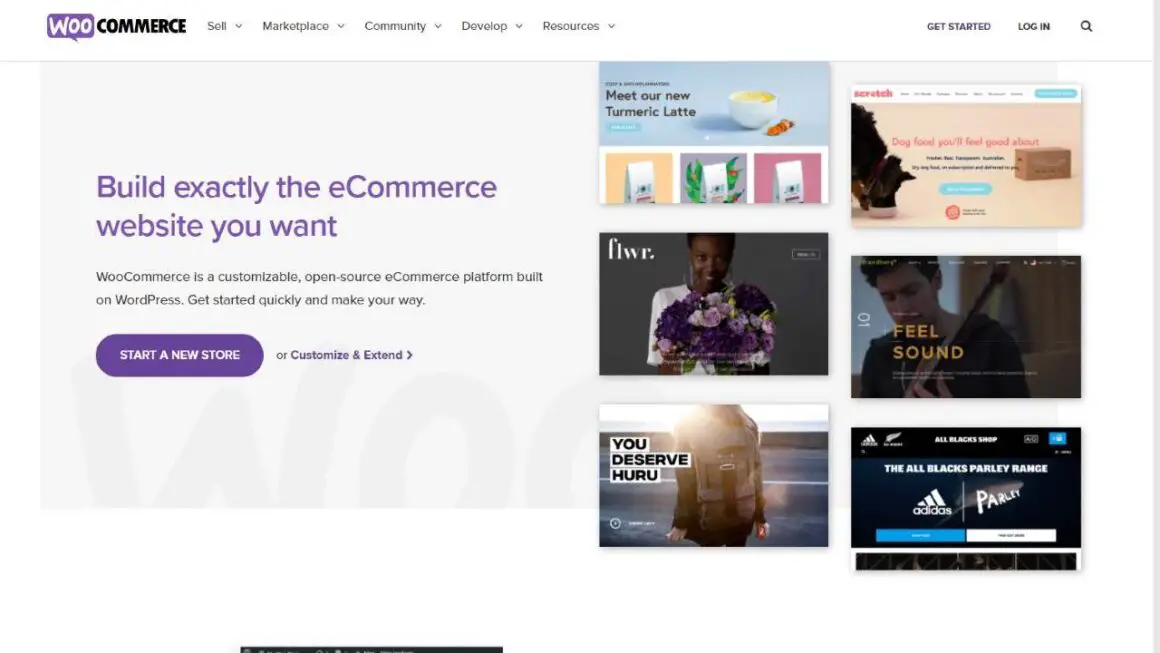
With more than 74 million downloads, WooCommerce powers around 25% of online stores globally. This straightforward open-source web-based business module for WordPress launched in 2011 and has developed into one of the most famous online business arrangements available today.
WooCommerce is a completely free plugin that you can include in your WordPress site. But for more advanced functionality, you need to include paid extensions.
A limitation is its scalability. It installs other plugins alongside itself to run, and this can slow one’s site down a bit.
Hindrances aside, there are a few reasons that so many people use WooCommerce.
First of all, it is highly customizable due to the open-source nature of the plugin. There is a big community of WooCommerce developers who add new functionality to the plug-in.
Secondly, WordPress is one of the best stages for SEO on the market. With limited SEO customizations and the capability to express more control over your search results, WooCommerce is a natural extension of the WordPress stage.
However, it is not the only choice, as I currently sell digital products on my WordPress site with the BigCommerce for WordPress plugin. I found it much faster as it is a “headless commerce” solution that works through an API.
In general, if you have a WordPress site and want to add eCommerce functionality for free, give WooCommerce a try.
More eCommerce platforms
11. ShopBase
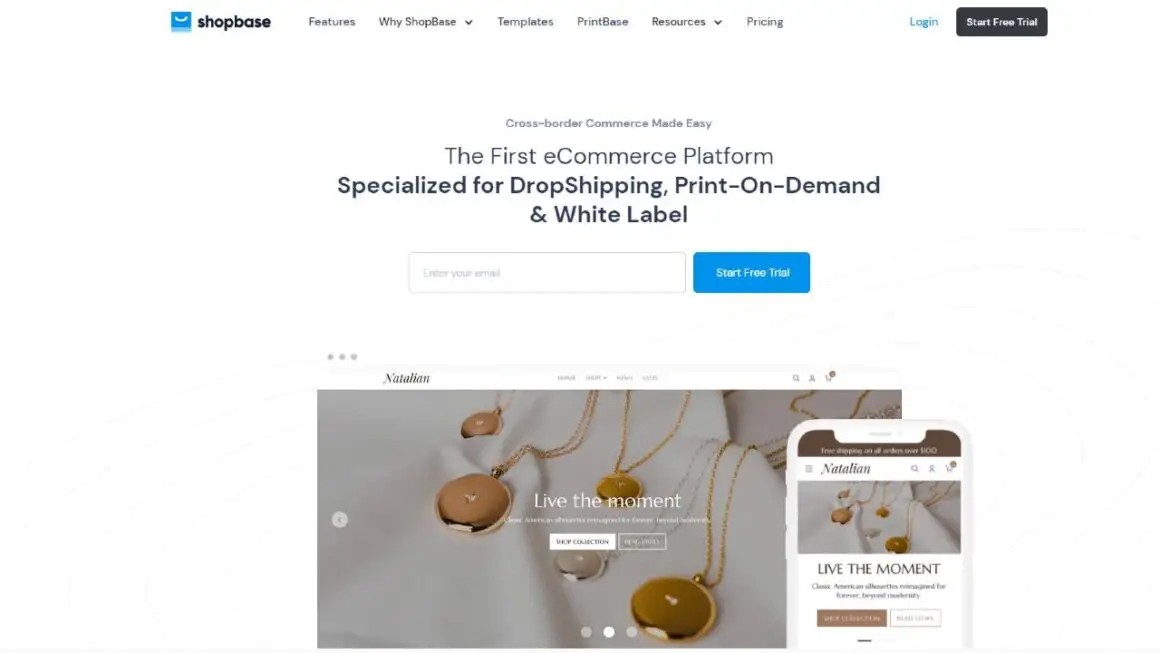
ShopBase is a brand new site in operation since June 2019. If you do dropshipping, they’re known as a great method and are searching for white labeling of your products.
ShopBase provides completely customizable, mobile-optimized shop fronts built by a renowned design team. Every page has its own unique settings and you can edit the HTML and CSS for each page as well.
You can edit any facet of your checkout page which is essential for conversion rates for your eCommerce. They also give emails to retrieve lost carts and enable guests to complete their checkouts.
ShopBase ranks among the best eCommerce platforms thanks to these additional features which include:
- Web hosting with an infinite bandwidth.
- An SSL certificate of 256 bits included on each package.
- ShopBase optimizes everything on the product pages and the checkout page automatically to maximize sales.
- Monitoring downtime 24/7 and uptime of 99.98 percent.
- Strong online shop builder.
- Well-designed but free store templates.
- Provide quality commodity procurement and service fulfillment to dropshipping merchants.
- The quick loading speed of the site. It claims to be 3x faster than any other marketable network.
- 250 types of items (2.5x more than Shopify).
- Importing your goods and shipping your store from another platform into ShopBase is fast. With the Migrate to ShopBase app, migration from another platform, such as Shopify or WooCommerce, is possible.
Other than that, ShopBase has only a few downsides.
For example, compared to other platforms, there aren’t as many apps in their app store to interact with. Moreover, if you don’t look for dropship, print-on-demand, or becoming a white label company, ShopBase isn’t for you.
Their plans begin at $19 / month, and their Basic Base plan offers everything you need to get up and running and make your first sale.
If you’re planning a white-label, print-on-demand, or dropshipping company to get started, ShopBase is the best option for you.
Give ShopBase a try with a free trial lasting 14 days.
12. Volusion
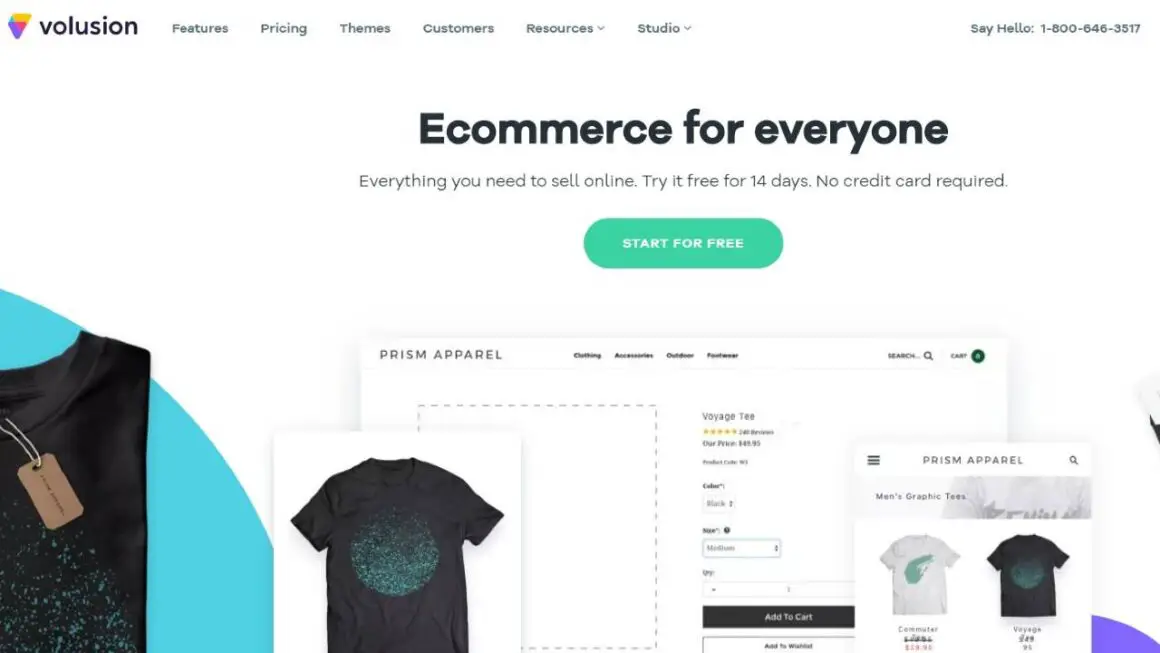
Volusion is a company that was founded in 1999 and launched in 2002 by Kevin Sproles, then a 16-year-old. It is a robust all-around eCommerce platform with plenty of features and a new content creator that almost rivals the Elementor WordPress plugin in ease of use.
Their Personal Plan for $26 / month comes with unlimited items, online support, and zero transaction fees.
The $161 / month Business Plan comes with more in-house support at the high end. An advantage of this eCommerce platform is that they have an in-house SEO and marketing team that can assist with digital marketing and search engine exposure.
Each month, higher-tier plans come with “$100 of quick wins.” If you’re a store owner, this could be a fast web design patch.
If you want to test Volusion, get started with a 14-day free trial.
13. Wix

Wix is a quickly developing web designer that permits clients to move up to full eCommerce functionality for $20 every month. They boast several designer-made templates, promotions and gift cards, attractive item displays, and simple order management and delivery.
They automatically optimize your online store on mobile, including iPhones and Android gadgets (Apple and Google). You can also personalize the appearance of your mobile eCommerce site with their online store developer tool. You don’t need to plunge into HTML or CSS to create a stunning website with Wix.
They have an amazing array of product displays to layout your products in a lovely (and conversion-optimized) way.
These product display design is great on mobile devices too and adapts in a stacked format.
Wix is otherwise known as one of the most straightforward tools to use in both the web designer and eCommerce space.
There are actually just seven stages expected to establish your online store:
- Log in to your account or sign up for free.
- Pick a template from the Online Store group.
- Edit the content and add your business name.
- Click “My Store” & “Manage Your Store”.
- Add items to your store.
- Select “Business Setup” to include Payments, Shipping & Store Settings.
- Link your domain and publish your website
Lastly, Wix provides important on-page features such as secure checkout, major payment options, and solutions. They also offer important off-page features such as 24/7 customer support, and coupons and discounts, worldwide tax, and delivery. These features can have a tremendous impact on your bottom line.
You can try Wix for free and start selling your products online.
14. PinnacleCart
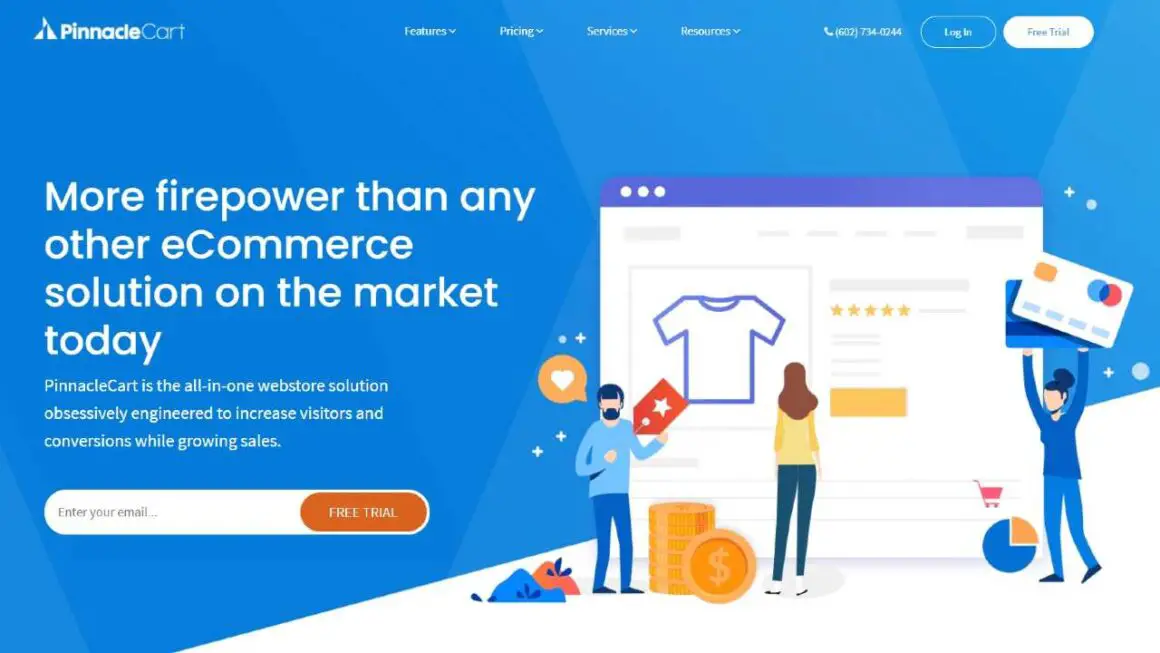
PinnacleCart was conceptualized with conversion rate optimization, search engine optimization and an intuitive user interface in mind. This is why the platform is rated as one of the best eCommerce platforms.
The improved SEO feature and integration with popular sites like Amazon, Facebook, and eBay can further improve your product and service exposure. In addition, Buy Buttons are available to help to promote your products on other websites or blogs. Users can buy your items from these other popular platforms. Ain’t that cool?
In addition to the Buy Buttons, they also offer enhanced productivity tools that allow you to create interactive product listings. These listings dynamically create identifiers, manage images, manage inventories, and create unlimited product attributes and categories.
Pricing:
PinnacleCart has three main plans.
The $44.99 Startup Plan provides zero transaction costs, unlimited goods, and unlimited accounts for administration. It also provides a one-page checkout, offers for real-time delivery, Google Shopping, predictive search, syndication of the product, and a shared SSL.
The Advanced a Plan, $199.99 / month offers extra advantages, such as a dedicated SSL, unrestricted storage space and bandwidth, and priority service.
A fascinating feature comes to those looking for their own server to host their eCommerce platform. They could buy a PinnacleCart perpetual license for $1,495 per domain.
15. Weebly

Weebly is a website builder established in 2006 that now boasts more than 500,000 domains and a 12 percent market share in the website builder space. Their framework works well for new websites for small businesses that do not need an advanced web presence
One advantage is that Weebly has built-in marketing automation tools. If you wanted to buy a separate website builder and email marketing service, you could be paying an additional $10-20 a month.
Another advantage is their choice of the commodity. You can handle hundreds of products, monitor inventories, automate items out of stock, and improve purchasing behavior by showing the remaining number of goods to consumers (only 3 left!).
Weebly isn’t as solid as other sites like 3dcart or Shopify. Nevertheless, if you’re a small business with under ten pages of a basic website and want to add some eCommerce features, Weebly will serve you well.
Their eCommerce feature starts with their business plan of $25 / month which also includes a free domain.
FAQs
Benefits of eCommerce platforms
1. Social media integration
Over 3 billion people in the world use social media – a huge market to tap into.
In addition, shopping behaviors are changing and more users are ready to buy products via social media.
Ecommerce platforms easily combine with Instagram, Facebook, and Pinterest so that you can sell your products wherever your audience is.
Therefore, it’s important to focus some attention on social media engagement.
For instance, let’s take a look at BigCommerce.
Their platform integrates with social media platforms like Instagram, Facebook, and Pinterest right from the BigCommerce control panel, synchronizing your inventory for you, and making the backend sales with little work required.
2. Excellent customer support
Customer service plays a significant part in every company’s yearly sales. In fact, it is one of the most symbolic yardsticks of a competitive company.
Even if you’re using a pre-designed template to create your website, you might run into a problem every now and then.
It can be anything — you can struggle with slow website speed or face webpage errors.
Every single eCommerce site, however, provides customer service to help you with these problems.
Bigcommerce, for example, addresses technical problems with 24/7 chat, email, and US-based phone support.
They also have a premium support team committed to making your company prosper and helping you overcome any possible technical challenges. And this can make all the difference.
With this kind of help and versatility, even technical difficulties can’t slow down the business.
3. Easy scalability
When you run a customary brick-and-mortar retail shop, it’s very hard to cater to an audience that is geographically remote.
Except you become very successful, and operate like Walmart and other industry leaders, setting up various outlets in different areas becomes too costly.
Naturally, it’s not very simple to do that for a small or medium-scale retailer, since it is remarkably cost-intensive.
Small and medium-sized enterprises, however, can now target and meet a global audience using eCommerce channels and scale up to several times their original size.
Most platforms allow you to set up your online store for between $15 and $50 a month, the most popular price being about $30.
In essence, being online makes the entire world your oyster, and you don’t have to target a specific community and limit yourself to a particular location. With a wider scope, the revenues will improve and, in the long run, profitability will increase. Ecommerce platforms help you achieve scalability by offering amazing shopping experiences anywhere and good performance.
4. SEO
Approximately every eCommerce platform provides basic advanced SEO functionality. These features boost exposure for your search engine and handle everything from sitemaps to meta titles, details, keywords, and more.
If you’re used to running sites on WordPress, you should check out WooCommerce for solid SEO results.
For instance, WooCommerce is integrated with some of the best SEO-related WordPress plugins which can help you optimize your website and make it appear higher in the search engines.
Some of the SEO tools include:
- Yoast SEO
- MonsterInsights
- All in one SEO pack
- Google XML Sitemaps
- W3 Total Cache
- BZ Lazy Load
- SEO Optimized Images
- WordPress SEO
Furthermore, platforms like 3dcart and BigCommerce provide excellent SEO support out of the box.
5. Built-In Ecommerce Marketing Tools
You will be led to where your target audience is as a result of social media integration, but it isn’t the only marketing you ought to do.
After your website is up and running, you need to ascertain what your customers want to buy with the right marketing tools.
Ecommerce platforms assist you to do that by providing several in-built marketing tools. These tools offer you all the essential data and analytics to help you draw a roadmap for future sales.
Take Squarespace, for example:
It helps drive traffic to your website with its powerful marketing tools and also measures your success quantitatively with its advanced data analytics tools.
Integrated newsletters, coupon codes, exit-intent pop-ups, and promotions are just a few of the marketing features of your service.
Is ecommerce easy?
Ecommerce is easy to get started with but challenging to be highly successful in. To get started, you don’t need a lot of money – you just need a website and a product list. You can also outsource the inventory and delivery process using dropshipping suppliers.
Even so, it can be difficult to be very successful as marketing your eCommerce brand is one of the most essential factors. You need to concentrate on SEO, PPC, social media marketing, email marketing, and other strategies to generate sales, in addition to posting the inventory online and managing customer service.
What is the easiest ecommerce platform?
Builders of eCommerce websites are intuitive and allow you to effortlessly create a website, add products and market your company online. Even so, some are easier to use than others. Here are the best accessibility and simplicity-based eCommerce platforms to use:
1. Wix.
2. Shopify.
3. BigCommerce.
How can I sell online for free?
If you don’t have the budget to use an eCommerce platform, there are other ways to sell online for free. Some of these include:
1. eBay.
2. Geebo.
3. LetGo.
4. Facebook Marketplace.
5. Craigslist.
Should I sell on Amazon or Shopify?
When it comes to small eCommerce businesses, I’d recommend Shopify. Amazon is easy to use but Shopify has proven to be a better choice. Shopify’s low-tier plans are more affordable than the lower-tier plans from Amazon. Thus providing a lower barrier of entry. More so, Shopify allows you to own your website which is very critical in establishing an online brand presence.
What ecommerce platform does Amazon use?
Amazon Web Services (AWS). All Amazon products make use of the AWS platform. AWS is one of Amazon’s biggest cash-cow as many major corporations use Amazon Cloud products – the AWS.
Can I sell on Facebook without a website?
Yeah, without a website you can sell products online via Facebook Marketplace. If you want to sell products on Facebook, you need a Facebook Page and goods to advertise. You can add product details to your Facebook profile, including product names, descriptions, prices, images, and more.
Check out how to sell and make money on Facebook
Is Shopify easier than WordPress?
The website builder in Shopify is easier to set up and use than in WordPress, where you face a steeper learning curve. Shopify has plenty of built-in eCommerce features that are not available in WordPress without plugins.
However, WordPress has various advantages, such as better SEO, more editing options, better blogging, and more. Ultimately, it is up to what you’re most comfortable with.
Summary
Now, that’s my list of the best ecommerce platforms.
- The best overall platform that is simplest to use and best for small businesses is Wix.
- If you want the best software to scale your large business, I suggest you get started with BigCommerce.
- If you’re a dropshipper that needs good integrations, Shopify is your best choice.
